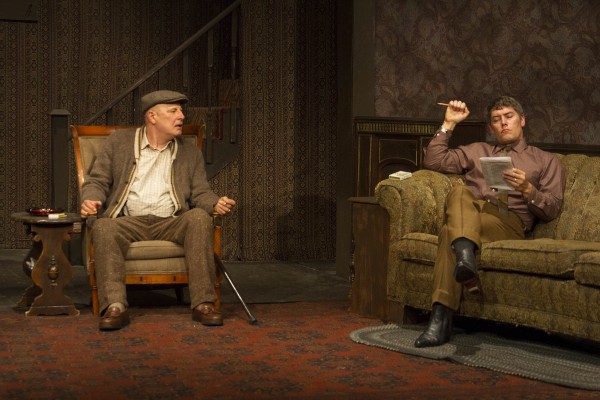Some people say that criticism is a lot easier to write than a play. Of course it is. It’s also better if it’s lucid, which a play does not have to be. A play can be dense, suspicious, indirect, gripping, make no sense and still be wonderful. So writing a lucid critique of a non-lucid play gets complicated.
These thoughts are brought on by that wordmonger and delightfully rude and wise curmudgeon Harold Pinter. Sitting through The Homecoming at Pacific Resident Theatre and watching a strong and clear (not lucid) revival of that play last Sunday afternoon was intriguing enough. But to follow that up in the evening at the same address with actor Julian Sands performing his charismatic evening of Pinter poetry (and other stories) only confirmed the variety and importance of non sequiturs in the late master’s verbal earthquakes and disturbances.
True to its title, Pinter’s The Homecoming examines the return to London of a first-born son to a feral fold of brothers, a father and an uncle. The first half of the play is full of those infamous Pinter “pauses, beats and silences” (as defined by Sands later that evening), giving the audience ample time to meet this unsavory lot — from the manicured pimp Lenny (a highly polished and controled Jason Downs) to the knocked-dumb wannabe boxer Joey (Steve Spiro), to dad Max (Jude Ciccolella), a retired butcher whose sharpest cuts now are strictly verbal, and Uncle Sam (really) a quiet chauffeur, played with understated dignity by Anthony Foux.

The escapee from this hellish household is Teddy (Trent Dawson, imprisoned in an impassive role), who has risen in the world to become a tight-lipped, boring professor of philosophy in the United States. He is visiting his home gingerly — and for the first time — with his English wife Ruth (the astonishing Lesley Fera), who may or may not be happy to be there and is the taciturn mother of their three American children.
There is not much to discuss when it comes to the quality of the production. It is staged with the right restraint, enigma and build by Guillermo Cienfuegos in Norman Scott’s grimy beige and brown monochrome setting (including clothes and furniture), with each scene bridged by strangely inappropriate music. Add that enigma to the play’s other mysteries. A Pinter choice…?
The performances by the actors are impeccable, especially Fera’s. Her Ruth dominates the stage with a silent, regal imperviousness, betraying no emotion except in sudden starts and only when you least expect them. If the men take a few spins at shocking her, she swiftly repays them in kind. As a result, the play’s second half lights a fire, with its level of menace and disconnection ratcheting up to some white-knuckle moments.
The Homecoming was never intended to be realistic. It was written in 1965, at a time of raging anti-establishmentarianism (how often does one get to use this endless word?), with too many unpopular wars, and when the world was beginning its slide into incoherence. It was fashionable to rebel against everything — your parents, your family, your country, whatever qualified. The aptly named Theatre of the Absurd was at its height and Beckett and Ionesco made indelible furrows in the field of non-sequiturs as part of their effort to illustrate the impossibility of human communication.
That is the world of The Homecoming — or rather the world that gave birth to it as something shocking, fine and new. Today, in our tarnished innocence, the nakedness of the play’s engineering invites some skepticism along with the lasting admiration. We see through parts of it as a calculated construct of word games locked in a time capsule. They are exemplars of a vivid, fermented era in our recent past, but they are not our present any more. Already, a little quaintness has set in.
That evening, Julian Sands, before a packed audience, focused on some of Pinter’s poetry and contrariness, with a bracing compendium of humorous anecdotes, tenderness and witty verse, revealing a side of Pinter we don’t often see. He was a poet of exquisite grace and zero cant, amorously playful and stubbornly uncompromising.

Sands, it must be said, was doing double-duty impersonating poets that weekend. He also appeared at UCLA as Robert Lowell in the L.A. Theatreworks radio theatre presentation of Sarah Ruhl’s Dear Elizabeth, a two-hander based on the lifelong exchange of lively letters between the poets Elizabeth Bishop and Robert Lowell — two damaged, teetering, talented friends linked by mutual respect, affection, unhappiness and maybe more.
Sands’ partner in crime was JoBeth Williams as Bishop, and the two of them, with just the right help from Ruhl, delivered a subtle, satisfying exquisitely intelligent evening of adult entertainment. The real kind.
Sometimes we, the audience, can get very lucky.
Top image: l-r, Trent Dawson, Steve Spiro, Lesley Fera and Jason Downs (with Juse Ciccolella, background) in The Homecoming. Photos by Ashley and Erika Boxler.
WHAT: The Homecoming
WHERE: Pacific Resident Theatre, 703 Venice Blvd., Venice, CA 90291.
WHEN: Thursdays-Saturdays, 8pm; Sundays, 3pm. Ends August 30.
HOW: Tickets $25-$34, available at www.pacificresidenttheatre.com or by phone at 310.822.8392.
THE GOOD NEWS BAR: Rogue Machine’s production of Samuel Hunter’s A PERMANENT IMAGE just announced an extension through August 17. It plays Saturdays at 5, Sundays at 7, Mondays at 8. Tickets and info at 855-585-5185 or www.roguemachinetheatre.com. It’s a do not miss.
